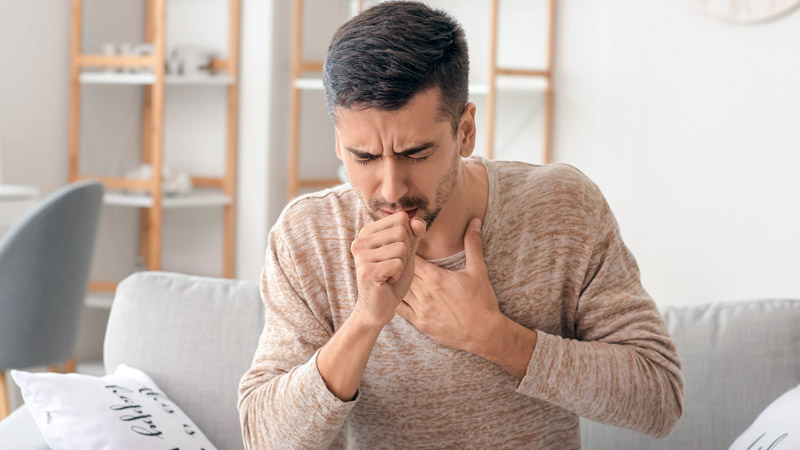Why You Cough After Eating and What That Means

(healthcareassociates)
A coughing fit is often the result of food going down the incorrect tube. On the other hand, some people cough after consuming particular meals. For instance, according to Haym Salomon Home for Nursing and Rehabilitation, you may generate more phlegm if you eat oily or fried meals, gluten, alcohol, or sugar. However, coughing isn’t always a terrible thing.
According to the American Lung Association, mucus, dust, or inflammation in the airways might cause a cough to spontaneously occur. Even after eating, a coughing fit is common, and your body’s method of getting rid of stuff it doesn’t like. For example, a chip may have landed in your throat at precisely the wrong angle to irritate it.
Coughing after meals, however, may indicate a more serious health issue, such as dysphagia, aspiration pneumonia, asthma, GERD, food allergies, or respiratory infections. Learn about these various illnesses and how your cough may be affected by them. We will also go through the many alternatives for treating your cough.
The Food and Drug Administration (FDA) of the United States states that millions of Americans have suffered from a food allergy. These usually only cause moderate responses, but in certain cases, they can be fatal. Food allergies can be managed with drugs and therapies, but there is no known cure.
Food allergies can manifest at any age, although they are most frequent in youngsters, according to the American College of Allergy, Asthma, and Immunology (ACAAI). In terms of medicine, a food allergy occurs when your body overreacts to a particular food, setting off a reaction. Ninety percent of allergy responses that are documented are related to eight foods: fish, shellfish, eggs, dairy, peanuts, tree nuts, wheat, soy, and sesame.
When someone comes into contact with a food allergy, they may have a variety of symptoms, including hives, coughing, shortness of breath, asthma, swelling, and digestive problems. When allergies are severe, the reaction can happen within minutes of exposure to the food but usually takes several hours. Severe allergies can cause shock and throat constriction, which call for immediate medical intervention.
As the Mayo Clinic points out, once an allergy has formed, the food must be avoided. This necessitates reading labels because certain foods, like soy, are readily incorporated. You can identify specific food sensitivities by seeing an allergist. For those who experience extreme responses to particular types of food, exposure treatments are a viable treatment option. Early exposure is also beneficial in preventing the development of some food allergies in youngsters.
Acid reflux, also known as gastroesophageal reflux disease (GERD), is a condition in which the contents of the stomach rise into the esophagus. You can get a sore throat, chest ache, and an aftertaste of bitterness in your mouth. Coughing after eating, however, may also indicate that your GERD is interfering with your life.
“Coughing during the night or right after eating are symptoms of reflux-induced cough,” Dr. David O. Frances states in a journal paper that was published. Most commonly, this cough is described as a GERD cough or a cough connected to GERD. According to an American Family Physician, a persistent cough is present in around 75% of GERD patients. Since there is no post-nasal drip, this cough is usually dry.
Testing and diagnosis of GERD through a visit to your healthcare practitioner and endoscopy are necessary for the relief of a GERD cough. According to Healthline, you should take GERD drugs including antacids and H2 blockers to assist in managing symptoms in addition to treating your cough. To help alleviate your symptoms, try making lifestyle adjustments including quitting smoking, altering your diet, getting in shape, and elevating your head while you sleep. Smaller meals might be beneficial as well.
A cough is a common side effect whether you’ve ever had the flu or a cold. Coughs from certain upper respiratory infections, such as bronchitis and Covid-19, are more severe than others. According to the Cleveland Clinic, these infections impair the function of your sinuses, throat, or lungs, resulting in headaches, sore throats, coughing, fever, exhaustion, and sneezing.
Your throat aches from all the discomfort caused by the infections. Consequently, eating and drinking might irritate your lungs and throat. It may also loosen mucus that has lodged in your throat, causing you to cough after consuming food or liquids. The Mayo Clinic disputes studies that suggest avoiding dairy or milk during a cold because it can increase mucous.
Asthma symptoms include wheezing and dyspnea. However, one little-known symptom that asthmatics encounter is coughing after eating. An investigation on the connection between coughing after eating and the swallowing technique was published in Asia Pacific Allergy. The research, which involved 121 asthma patients, discovered that 76% of them coughed after eating spicy meals and 53% coughed after eating sour foods. Additionally, postnasal drip was shown to be more likely in asthmatic individuals who had coughed due to eating.
About 8.7% of Americans, according to the Centers for Disease Control and Prevention, have symptoms of asthma. Breathing becomes difficult due to the restricted and irritated airways caused by this chronic illness, according to the National Heart, Lung, and Blood Institute. An attack can be triggered by a number of things, including exercise, allergies, odors, dust, hair, and weather.
To stop an attack, you must always have an emergency inhaler with you. Although there is no known cure for this illness, there are particular medications that can assist in managing it. According to the World Health Organization, patients can also employ therapies, oral drugs, and steroids to improve their breathing.


